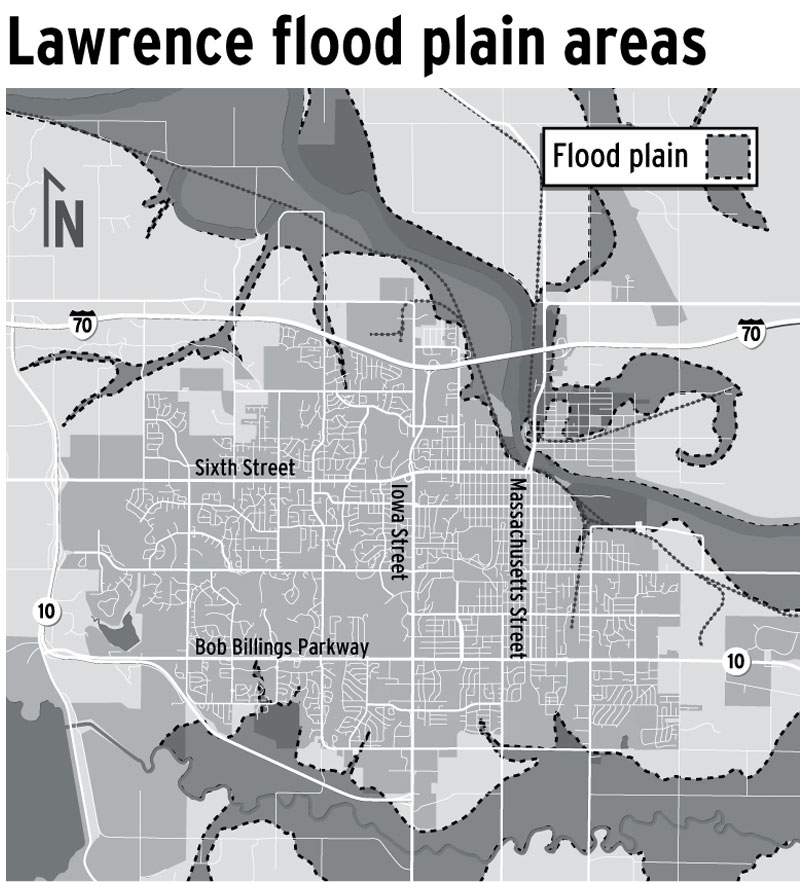Flood warning
City warns property owners of peril
Stan McMechan knew there was a ditch in the backyard of the home that he was looking to buy in the 2500 block of Atchison Avenue.
But he didn’t know the innocent looking little creek could add on hundreds of dollars to his annual homeowner’s insurance policy. He didn’t find that out until his banker told him he might have to get flood insurance before he could get a mortgage for the home.
“It became a real issue when I was trying to get money from the bank,” McMechan said.
City leaders are hoping to eliminate similar surprises in the future.
The city’s planning department this week sent out 1,528 fliers to property owners in the flood plain. Goal No. 1 of the flier was to simply alert people that they live in a flood-prone area. That notification is important because it is not just people who live in North Lawrence or right near the banks of the Wakarusa River who are at risk of flooding.
A flood plain map of the city shows that tributaries of the Wakarusa River create flood-prone areas as far north as Bob Billings Parkway in western Lawrence, and tributaries of the Kaw create flooding problems as far south as 19th Street in parts of eastern Lawrence. The map also shows numerous other smaller pockets of flood plain areas throughout the city.
“You would hope that people would know they’re living in the flood plain, but I’m sure there are people who don’t,” said Amy Miller, a long-range planner overseeing the mailings.
But people should know, and potential buyers of property in the flood plain should know about the risks up front too. Miller and others, though, have concerns that many potential buyers are not learning that their new homes are in the flood plain until they are deep into the buying process.
Floodplain development
- 6News video: City officials warning residents of flood possibilities
- City of Lawrence map of floodplains (.pdf)
- Information flyer for individuals who own property in the floodplain (.pdf)
- Intensified development raises risk of catastrophic floods in U.S. (02-19-06)
- North Lawrence repairs total $41M (01-09-06)
- Couple sell flood-plagued home to city (12-30-05)
- N. Lawrence’s future hinging on continuing floodplain study (10-14-04)
“From what we hear, a lot of people don’t know about it until their bank tells them they need flood insurance,” Miller said.
Many times that news is delivered to potential buyers just a day or two before they are set to close on the property. That’s not the way the process should be happening, Miller said. She said the city hopes the fliers will make homeowners aware that when they sell their homes they’ll have to tell potential buyers it’s in a flood plain.
City ordinances technically require the seller of a home in the flood plain to make a buyer sign a document that acknowledges they have been told the property is in the flood plain. The disclosure statement will be printed in bold 12-point type stating that the property may be inundated by flood waters, there is the possibility of the loss of life and personal property as a result of a flood, and that flood insurance may be required for the property.
Some real estate agents, though, said such disclosures by sellers often did not happen. Instead, many are relying on a standardized disclosure form that simply tells a potential seller or buyer to call the Lawrence-Douglas County Planning Department to find out whether the property is in the flood plain.
Miller, though, said such calls to her office are infrequent.

“People really need to understand that it should be the responsibility of the seller to find out that information and then disclose it to potential buyers,” Miller said.
Miller said she and other members of the planning department were offering to go out to real estate agencies and provide training on the city’s disclosure requirements.
Berniece Garber, an agent with Lawrence’s American Dream Realty, said more education would be useful.
“I’ve been in this business eight years, but if you are new to the business, I’m not sure you really even understand what the flood plain really means,” Garber said. “I’m not sure it is really covered that much in real estate classes.”
She said many people rely on mortgage lenders to discover that the property is in the flood plain. Lenders do a flood certification on every property to determine whether they will require flood insurance to be taken out on a home.
Finding out late in the process, though, can create an unexpected hurdle for buyers. Ron King, a Lawrence insurance agent with American Family, said some flood insurance can cost up to $2,000 per year, but said most policies were between $300 to $800 per year.







